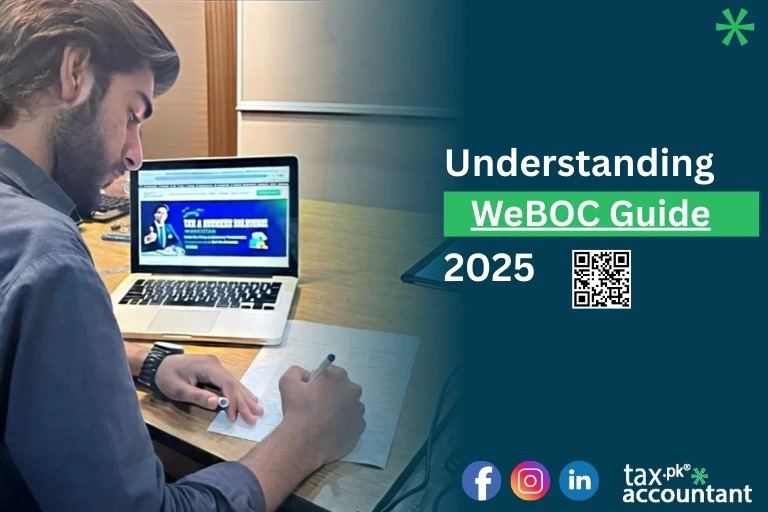Imagine a world where your import and export processes flow seamlessly, paperwork becomes a breeze, and goods clear customs faster than ever before. For businesses navigating the complexities of international trade in Pakistan, this vision started to materialize with the arrival of WeBOC (Web-Based One Customs) https://www.weboc.gov.pk/. This digital powerhouse has been a game-changer, revolutionizing how customs operations are managed. But the journey doesn’t end here! Buckle up as we delve into the key features, benefits, and the exciting evolution towards the Pakistan Single Window (PSW) https://www.psw.gov.pk/, which promises an even smoother ride for traders. Let’s unpack how these digital solutions are reshaping Pakistan’s trade landscape!
WeBOC: Streamlining Customs and Trade in Pakistan
WeBOC (Web-Based One Customs) is a digital system implemented by the Federal Board of Revenue (FBR) https://fbr.gov.pk/in Pakistan to streamline and facilitate customs-related processes for import and export businesses. Launched in 2011, this online platform acts as a central hub for managing and processing customs documentation and transactions.
Key Features and Benefits of WeBOC
- Simplified Filing Procedures:
WeBOC has significantly simplified the process of filing Goods Declarations (GD), making it easier and more efficient for traders.
: The system has accelerated the clearance of goods, reducing delays and improving the overall efficiency of trade operations.
- Real-time Container Tracking
: WeBOC allows for straightforward tracking of containers, providing transparency and better management of shipments.
: WeBOC offers a modern way of collecting tax payments through the internet, making it easier for businesses to pay Customs Duties, taxes, and other dues electronically.
- Transparency and Compliance:
- By providing a transparent transaction trail, WeBOC helps traders comply with regulations and avoid potential taxation issues.
Web-Based One Customs (WeBOC) offers numerous advantages for businesses involved in import and export. This digital system streamlines customs clearance processes, enabling faster Goods Declaration filing and quicker cargo clearance. It promotes transparency through online operations and facilitates easy tracking of containers. Moreover, WeBOC reduces costs, minimizes physical paperwork, and provides speedy access to crucial tariff and regulatory information, ultimately fostering economic development and easing international trade.
WeBOC Registration

To utilize the WeBOC system, businesses involved in import and export activities must register. The registration process involves several steps:
- Application Submission
Complete the WeBOC External User Registration Form and gather all required documents.
- Verification
The designated applicant must appear in person before the Deputy or Assistant Collector.
- Business Premises Visit
Officials may visit the business premises to verify the operational setup.
- Application Review and Approval
Authorities thoroughly check the application and supporting documents.
Essential Information for Registration:
- Tax and Business Identification
- Business Details
- Contact Information
- Bank and Financial Details
- License and Operational Details
Documents Required for Registration (varies based on business type):
The documents required for WeBOC registration can vary slightly depending on the type of business (sole proprietor, partnership, or private limited company). However, here’s a general list of commonly required documents:
General Requirements for All Business Types:
- Original CNIC (Computerized National Identity Card) of the owner/partners/directors.
- NADRA Verification of the CNICs.
- Original NTN (National Tax Number) Certificate issued by FBR (Federal Board of Revenue).
- Active Taxpayer List (ATL) status for Income Tax.
- Business Premises Documents:
- Ownership documents OR a Rent Agreement (original) along with a photocopy of the landlord’s CNIC.
- Latest Electricity Bill (original) of the business premises.
- Latest PTCL Bill (original) of the business premises (if applicable).
- Valid Chamber of Commerce and Industries Certificate (original).
- Bank Account Details:
- Original Bank Statement of the business account for the last six months (often with a minimum balance requirement).
- Original Bank Maintenance Certificate of the business account.
- Original Bank receipt for the cash deposit (usually PKR 500) in favor of the Director of Customs.
- Undertaking on stamp paper of a specific value (e.g., PKR 100), as per the prescribed format.
- Filled WeBOC External User Registration Form.
- Personal Appearance of the owner/director/partner with a visiting card and passport-size photographs.
- Request letter for the issuance of a WeBOC ID on the official letterhead.
Additional Documents for Specific Business Types:
- Private Limited Company:
- Original Incorporation Certificate from SECP (Securities and Exchange Commission of Pakistan).
- Original Memorandum and Articles of Association attested by SECP.
-
- Copies of Form II, Form 29, Form A (or relevant forms as per the Companies Act).
- Original Board Resolution for WeBOC ID.
- Authority letter from other directors (if applicable).
- Partnership Firm/AOP (Association of Persons):
- Original Partnership Deed and Form C (or Form D for modification).
- Authority letter from other partners on stamp paper.
Important Notes:
- Original documents are usually required for verification.
- You may need to provide photocopies of some documents as well.
- Ensure all forms are correctly filled and signed.
- It’s advisable to check the latest requirements from the Federal Board of Revenue (FBR) or the relevant customs authority, as these may change.
- Some sources mention the requirement of the Sales Tax Registration Certificate (STRN) and being active on the Sales Tax ATL.
For the above services, you can always approach us at https://taxaccountant.pk/ .We serve our customers in the best way possible.
Transition to Pakistan Single Window (PSW)
The Federal Government of Pakistan is transitioning from WeBOC to the Pakistan Single Window (PSW) system. PSW offers a more comprehensive platform that integrates various trade-related activities beyond just customs clearance.
Why PSW is considered superior:
- Comprehensive Integration: PSW streamlines processes, making trade operations more efficient.
- Simplified Procedures: PSW simplifies cross-border trade by integrating processes of essential stakeholders.
- Reduced Time and Costs: By centralizing document submission and processing, PSW cuts down time and costs associated with trade.
- Enhanced Transparency: PSW promotes transparent trade transactions.
- Unified Registration and Access: PSW provides a unified registration system with single sign-on access.
- Improved Risk Management: An integrated risk management system within PSW ensures more efficient and targeted inspections.
- Real-time Information and Notifications: PSW offers real-time updates on transaction statuses.
While WeBOC has played a crucial role in digitizing customs procedures in Pakistan, the transition to PSW represents a significant upgrade in trade facilitation infrastructure, offering a more efficient and user-friendly platform for traders.
Would you like to explore any of these aspects in more detail?
















One thought on “Empower Your Exports: Your 360° Ultimate WeBOC Handbook”